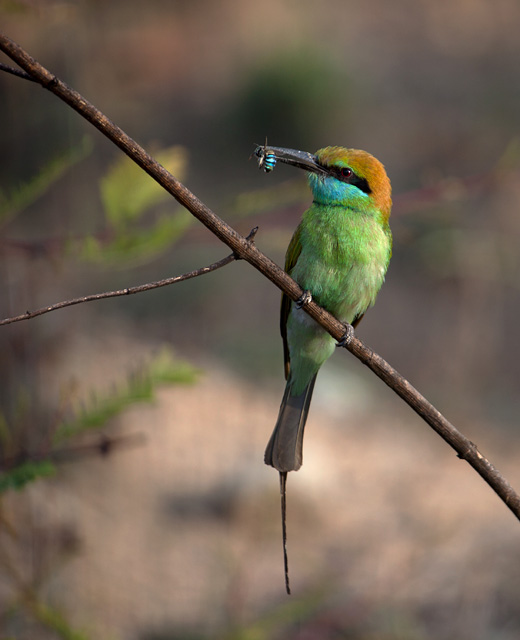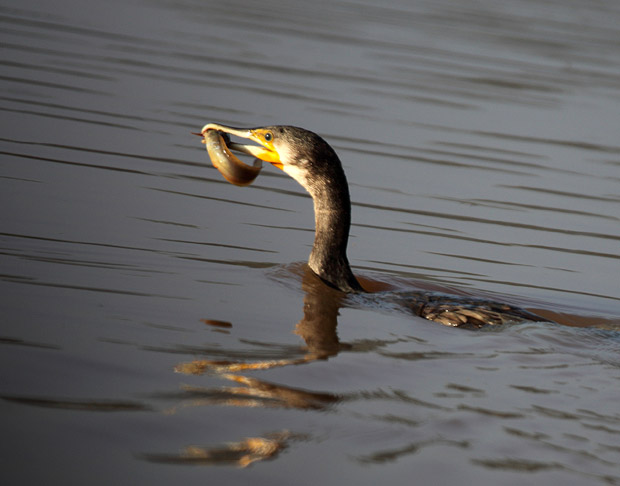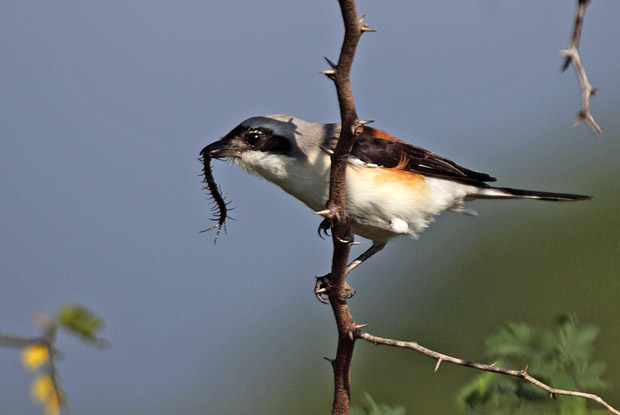Image – Green Bee Eater
A Green Bee Eater, photographed this morning.

A Green Bee Eater, photographed this morning.

Posted here are last of the images from last birding session. It is always nice to see birds gulping their prey.
This cormorant was fishing along with a bunch of its friends. Each time they went in, they would come back with a fish struggling between the beaks. Also read my commentary of watching a cormorant hunt in the water. They are very swift swimmers.

An Indian Cormorant.

Bay backed shrike
We watched this shrike sitting on a short perch and looking around. It flew out and came back with this centipede (or whatever worm it is) so fast, it must have taken less than a second. The centipede struggled for another 5 seconds before it was consumed.
Auli -> Rishikesh -> Corbett National Park -> Varanasi -> Agra
+Previous: landscapes of Corbett
+Next: An encounter with pachyderms
+Go to beginning of the series
After my tryst with the desperate tiger hunters during the day trip, I decided to go and stay inside the forest for a few days. Corbett Tiger Reserve has several guesthouses inside the forest for tourists. And staying in one of these is definitely the best way to see the park. Of the several guesthouses spread all around the forest, Dhikala tourist complex is the only place that has restaurants to serve tourists. In all other places, you need to take care of your own food.
Next morning, I went to Corbett Tiger Reserve office and booked for a stay for three days at Dhikala. I hired a jeep and a driver to accompany me for these three days. My driver, it turned out had a decent knowledge of birds and helped me spot and identify quite a few of them. With a jeep exclusively for my own use and a chance to explore the park as I wished, it was far better than the chaos I experienced during the day trip.
DHIKALA TOURIST COMPLEX
Dhikala is a small fenced tourist village, with a few buildings for tourist accommodation and to house the park staff. There are two restaurants to serve the tourists, a library that hardly gets used, a couple of machaans for viewing the riverbed and nothing much else. The whole complex is now protected with electric fence – something they had to install after a tiger made a failed attempt to maul a tourist! A few domestic elephants with their Mahouts are often seen wandering in and around the complex. A sambar deer with an injured leg, which would have never survived in the wild has cleverly moved into the complex and made the place its home. You could often find it walking right next to you hoping to find some food to eat.

A whistling thrush at Dhikala
The tourist complex, located next to magnificent grassland, is located right on the bank of river Ramaganga. Its landscape is beautiful and views of the river and the far off mountains on the other side in the early morning fog alone makes a trip to Dhikala worthwhile. Facing thick Sal forest on one side, Ramaganga flowing besides it and huge grassland on the other side, Dhikala is heaven for wildlife viewing. You can often see elephants wandering in the grassland, wild boars moving around, deer grazing and even occasional tigers walking by the river bed, all this without even leaving the tourist complex! A good pair of binoculars can even help spot crocs in the river.
WANDERING IN THE PARK
I was keen to use my time in the park judiciously. I roamed all around the grass land, along the river bed, into the forest – anywhere where we could go, looking for great vistas and some wildlife. Etched in my memories are the beautiful mornings when it would still be foggy, and the golden rays of the sun would fall into the earth on the banks of Ramaganga, making the whole world appear beautiful orange. The mild and soothing cold wind enhanced the experience of the late winter mornings.

A vulture, I am yet to figure out its name.
Wildlife viewing was also equally fruitful. Corbett is a heaven for raptors(birds of prey), and I did manage to see my share of them including changeable hawk eagles, Pallas fishing eagles, crested serpent eagle, few vultures and some more I could not identify. And then there were other birds on the riverbed like the river lapwing and white-capped redstart, which were shown to me by my driver. The grasslands were primarily inhabited by larks, partridges, bay backed shrikes and common stonechats. I also saw some larger birds like the egrets, cormorants and white-necked stork.

An elephant having dust bath
Mammals were in plenty too. Elephants often wandered in the grasslands and I took pleasure in watching them as much as I could. And then there were smaller herbivores like the wild boars, several type of deer such as the barking deer, chital, hog deer and sambar deer and then of course the tiger.

Northern Rhesus Monkeys at Dhikala
At the end of three days, I felt that the trip to Corbett was worth it. It was saddening that I had to leave, and could not afford to stay on any longer. I fell in love with the place so much that I wished to relocate here and work in or around the park for a few years. I even discussed working as a naturalist and happened to receive some positive feedback on it. I am not sure if I would ever manage to make such a jump, but I know I will definitely return to Corbett again and savour more of its beauty.
More on Corbett National Park at paintedstork.com
* Images from Corbett
* Arriving at Corbett
* First day at Corbett: safari day trip to Dhikala
* Corbett: In the nature – A struggle between fear and love
* The desperate tourist’s tiger hunt
* Photo Essay: Landscapes of Corbett
* My Days in Corbett
* Encounter with Pachyderms
* Information about Corbett National Park
* Moving on from Corbett
Powered by sciolism 2019 and WordPress.